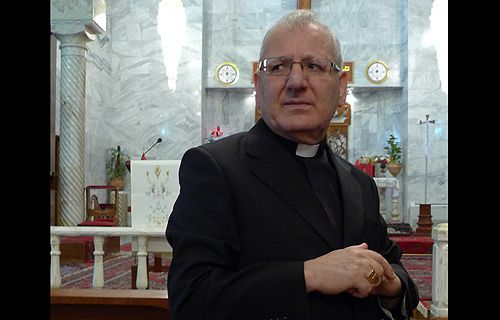The Chaldean patriarch has urged Iraq to turn away from its current path, warning that the new policies of Islamist jihadists threaten Christian-Muslim coexistence. “Should this direction continue to be pursued, Iraq will come face to face with human, civil, and historic catastrophe,” Chaldean Patriarch of Babylon Louis Raphael I Sako said in a July 17 message he described as “urgent.” He called for peace and co-existence “in a spirit of human brotherhood.” “We implore in particular our Iraqi brothers, asking them to reconsider and reflect upon the strategy they have adopted and demanding that they must respect innocent and weaponless people of all nationalities, religions, and sects.” He spoke weeks after the Islamic State of Iraq and the Levant occupied the northern Iraqi city of Mosul, and as the organization was beginning to force Mosul's remaining Christians from the city. On July 18, ISIS issued an ultimatum to the Christians of Mosul: convert to Islam, pay the jizya, or be killed. The cross atop the city's Syriac Orthodox cathedral was removed, and thousands of Christians have fled the city in recent days. ISIS currently controls much of the Sunni areas of northern and western Iraq, as well as cities along the Euphrates River in northwest Syria. Members of the group have threatened both Christians and Shia Muslims. Patriarch Sako called on Christians to “endure the time of trial and pray until the storm will be over.” He said that Islamist jihadists’ control of Mosul and their proclamation of an Islamic state has had profound negative effects upon the Christian population. Given the ultimatum from ISIS, he said that “the only alternative (for Christians) is to abandon the city and their houses with only the clothes they are wearing, taking nothing else. Under ISIS' imposition of sharia law, when Christians leave the territory, their houses are “instantly confiscated” as property of the Islamic state. The patriarch said that the Arabic letter 'nun', which stands for “Nazarene” or “Christian,” has been written on Christians’ homes in the city. The letter 'ra', which stands for “Rejecter,” has been written on the walls of Shiite homes. The new law code is “powerful” and has been interpreted to require religion-based forms of identification. Patriarch Sako said that this categorization affects many Muslims and contravenes Islamic injunctions against compulsion in religion. “The Holy Quran has ordered believers to respect the innocent and has never called them to seize the belongings, the possessions, the properties of others by force,” he said. He said that Christians and Muslims in Iraq have had a “fraternal life” thusfar. “How much the Christians have shared here in our East specifically from the beginnings of Islam,” Patriarch Sako continued. “They shared every sweet and bitter circumstance of life. Christian and Muslim blood has been mixed as it was shed in the defense of their rights and lands. Together they built a civilization, cities, and a heritage. It is truly unjust now to treat Christians by rejecting them and throwing them away, considering them as nothing.” He warned that legally enforced discrimination eliminates the possibility of religious coexistence between religious majorities and minorities. This will be “very harmful” to Muslims, as well, he noted. The patriarch wished God’s peace and mercy “to all who have a living conscience in Iraq and all the world,” to moderate Muslims, to “all who have a concern that Iraq should remain a country for all his Children,” and “to all protectors of the dignity of human beings and of religion.” Patriarch Sako called on all the region’s Christians “to act with reason and prudence and to consider and to plan everything in the best way possible.” “Let them understand what is planned for this region, to practice solidarity in love, to examine the realities together and so be able together to find the paths to build trust in themselves and in their neighbors,” he said, urging them to stay close to their own church.
